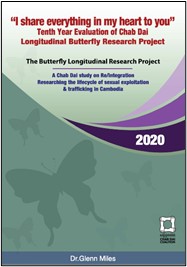The objectives, of the study, have been significantly achieved;
a) To provide an opportunity for survivors of sexual exploitation/trafficking to express their re-integration experiences in order to give dignity and voice to this marginalized group about their life experiences, challenges, and perceptions towards service providers.
Responses from participants themselves when asked about the process, did indeed feel that their voices were heard in an ethical and dignified way. Although a few described the stress and anxiety of answering questions for example about the legal process, overall, this weighed favourably against the enjoyment and appreciation of being listened to and heard and the information received. In fact, it seems to have provided a role in follow up that was not achieved by the Aftercare organizations themselves. In summary, the actual process of being asked questions was seen by the majority of survivors as mostly a positive experience which they enjoyed, even looked forward to and it did not appear to add stress to their already challenging lives. Although some discussions did create some anxiety for example around the legal process the participants agreed to share their experiences so that others could learn from the process. In addition, confidentiality was able to be maintained throughout the entire process which enabled participants to trust the researchers and to open up further about their experiences. In a TED talk on the Harvard Longitudinal Study1, the importance of relationships was emphasized.
b) To present the perspectives and experiences of a cohort of sexually exploited/trafficked individuals to Butterfly NGO partners and other relevant stakeholders in Cambodia in order to expose them to this cohort’s views and experiences through roundtable discussion, forums, and workshops with anti-trafficking partners and stakeholders on findings, themes, and recommendations.
In interviewing the researchers about their experiences of doing the research and communicating with stakeholders many of them felt that they had done what they could to work with stakeholders. Some said that some of the stakeholders became less cooperative over time, perhaps because those who were involved in the early stages were no longer working with the stakeholder organizations as the project continued. The research team did admit that in the final stages that they found it hard to juggle everything that they needed to do and that they did not invest as much as they could have done in maintaining a relationship especially where that relationship was already challenging or fragile. Mostly stakeholders felt that the information they received was useful in the development of programs and policies. Although the staff mostly provided opportunities for stakeholders to be involved in the process of the reports this was not always taken up.
However, even though most of the research staff available in Cambodia were not
trained in research and often had only undergraduate degrees (although some gained postgraduate education during the time they were working on the project) the data obtained was thorough enough to be used by practitioners, policymakers and researchers. A number of stakeholders described how programs and policies did change as a result of the findings. Indeed, the research staff described how being part of the research team helped them in their personal development and research abilities. It is also apparent that the Butterfly Longitudinal Research project was successful to do this in the context of an NGO network with academic support rather than in a University with NGO support. In fact, the intimate relationship that the staff had was unlikely to have been possible by academic staff flying in and out from International Universities. However, from the current peer review pacers being published it did and will continue to provide rigorous enough data for peer review journals. Was the longitudinal mixed methodology appropriate in the context? The longitudinal research project did evolve over the time of the project to produce both comparative results and also in-depth information that would probably not have been possible if other methods were used. This was mainly due to the deep trusting relationships that the research team had with the participants. This itself enabled them to open up and share on a deep level
c) To disseminate the research findings and lessons learned amongst mixed audiences of practitioners, policymakers, government bodies and academics within the wider regional and global community who are concerned and/or addressing the issues of people who experience reintegration following sexual exploitation and trafficking. To provide specific confidential feedback to partner organizations, as needed and requested.
Interviews with stakeholders in which they were asked them questions around whether the research findings found that the data and recommendations in the original technical documents did provide useful information for them e.g. for aftercare programs were able to provide better care for survivors, policymakers could improve policy and programmers and researchers could use the information to build on information gained. In addition to broad lessons learnt specific confidential feedback was provided to partner organizations as needed and requested e.g. where participants were experiencing bullying. A significant number of research papers have been written already or are in the process of being written.

